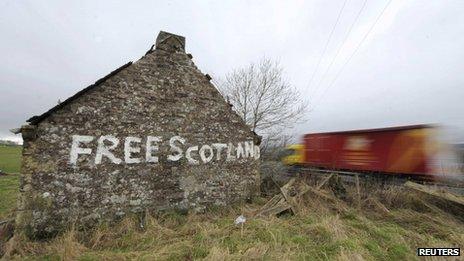Confusion max? The referendum made simple
-
Published

You can't have a constitutional crisis without a paradox, because it is the nature of the beast.
Lawyers like nothing more than an insoluble case, for the simple reason that it is never-ending.
And if you begin to worry about the propriety of a Section 30 order under the Scotland Act as against case law on the scope of the Scottish Parliament's powers you will end up, in this Dickensian year, feeling as if you are doomed to spend a lifetime in the cause of Jarndyce and Jarndyce, with Scotland the unhappy ward of court.
But fear not, there is relief at hand.
It turns out that in the argument over Scotland's future in the United Kingdom, the politically paradoxical is more interesting than any legal furore that might flare up over the coming referendum.
Consider two facts. Michael Moore, Liberal Democrat and Secretary of State for Scotland, says there should - must - be a straight yes-no question on independence on the referendum ballot paper, though he and his party are historically committed to the increase of powers for the Edinburgh parliament within the UK known as "devo max".
Alex Salmond: Referendum must be "made in Scotland and decided by the Scottish people"
And Alex Salmond, Nationalist and First Minister, whose party regards that option as a false kind of non-independence, says it must be offered as an alternative because many Scots might want to choose it. Work that one out.
The answer is simpler than it may at first appear. Both sides in the argument have been forced by David Cameron's intervention to make the first moves in what is going to be an absorbing chess game lasting at least 18 months, and naturally they have chosen to attack - to try to find their opponent's tender spots.
Leave aside for a moment the prime minister's decision to force the pace and remind Scotland of Westminster's legislative supremacy on constitutional matters - whether it turns out to be cackhanded or a skilful change of pace will be determined by the way ministers address the question in the coming months, and the tone they adopt.
The important point is that the clock has started to run.
Until now the pent-up arguments and frustrations of nearly four decades of constitutional argument in Scotland were still simmering in the pot, as they have been for a generation. Now they're on the boil.
So Salmond begins by appearing reasonable - a referendum in late 2014, time for debate, and a set of options for voters beyond yes-no. What could be fairer than that?
And the government, supported by all the non-independence opposition parties in Scotland, says the smile needs to be wiped off his face. It's a big decision; it must be made soon; a straight choice has to be put to the vote. Why not?
These are the opening positions, before most of the pawns have started to move, and they will change.
Salmond is a born negotiator, and even if he fancies a challenge to the Supreme Court (little noticed outside Scotland, he has been limbering up for one for a year or so now) he will look for a deal that will let him appear not simply as the First Minister who put the question to the people, but as the man who played fair.
On the other side, an insistence on an early vote on Westminster's terms will begin to play second fiddle to the nuts-and-bolts arguments over independence - Scotland and the Euro, defence, investment, the costs of independence for the rest of the UK, the deficit - and the fact that as Sir Menzies Campbell put it on BBC Radio 4's Today this morning "independence isn't just for Christmas" but for ever.
Alistair Darling: "I will play my part in fighting for what I believe in"
The intervention of Alistair Darling, the former chancellor, is intriguing. However modest he may claim to be in his aims, he is placing himself at the forefront of the campaign - making his party's case that progressive politics doesn't mean embracing a Salmond vision of a new Scotland.
For Labour it is difficult - its Scottish election performance was humiliating, its troops are dispirited, and its talent on display at Holyrood is limited.
But if Cameron's intervention was designed to summon the big beasts out of the jungle's dark corners it may work: there's public talk of cross-party co-operation in the anti-Salmond camp as never before. Darling wants to play a big part.
That is why no-one should feel queasy about talk of the courts, and the stirrings in the ranks of constitutional lawyers.
What has happened in the last 24 hours is that the politics of the referendum have started to run, and they won't be stopped by Section 30 or a Supreme Court justice or anyone else.
Alex Salmond has been expecting this moment, and will have his strategy ready. His opponents know how formidable it will be, and the challenge in the opening phases of this long struggle is for them to match it.
-
-
Published17 January 2012
-
-
-
Published11 January 2012
-
-
-
Published10 January 2012
-